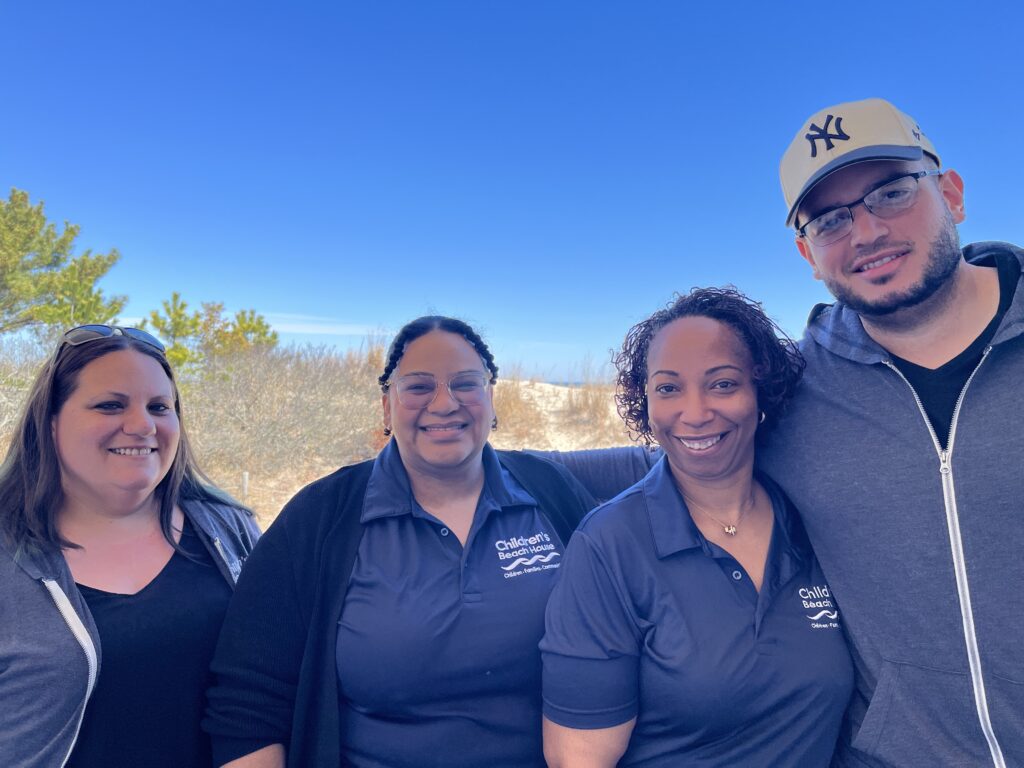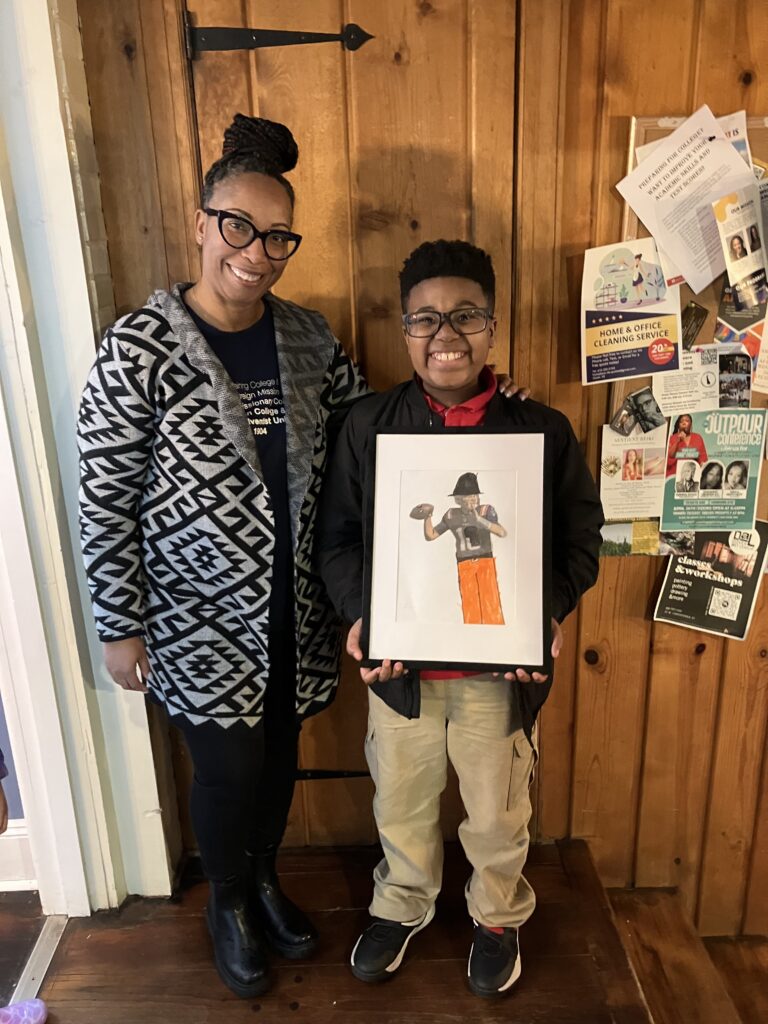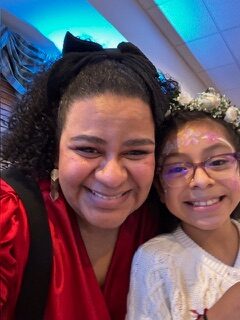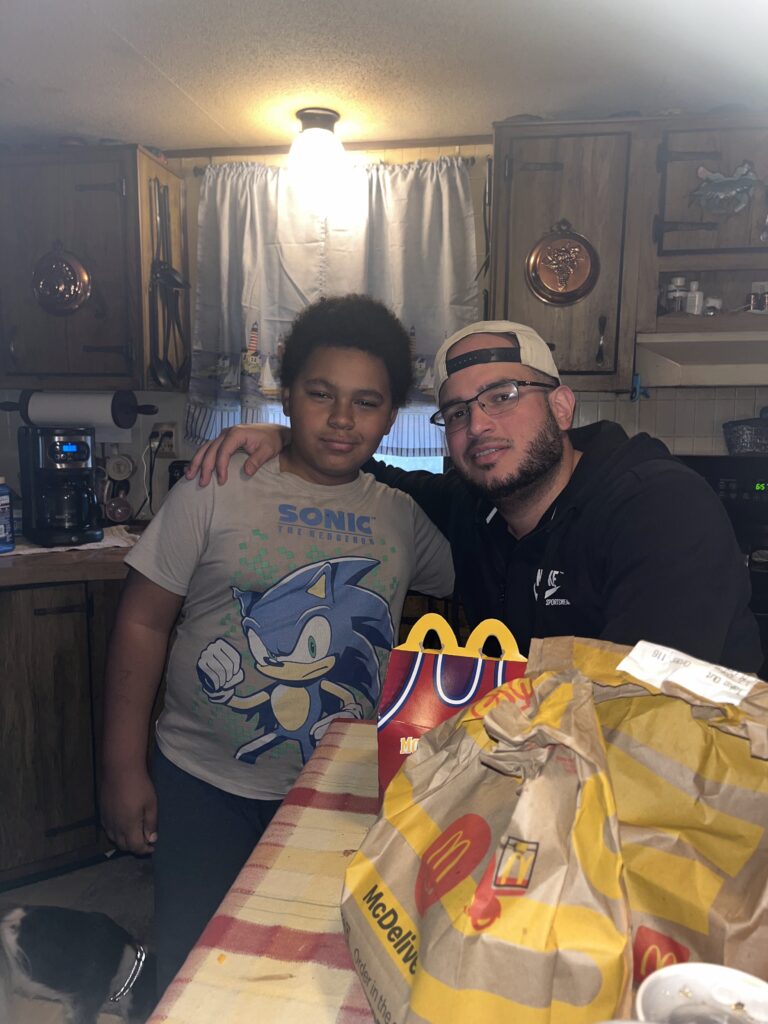
(L to R): Family Engagement Coordinators Nicole Van Matre, Elisa Lopez, Armina Domingue, and Enrique Quijada
The typical day of a Family Engagement Coordinator is anything but typical.
As one of the most important, and perhaps least understood, parts of Children’s Beach House’s work with children, families, and communities, Family Engagement Coordinators (FECs) serve as families’ primary liaison to CBH. They help families achieve their own goals for stability and progress. And because family units are the single most important factor in a child’s development, FECs are an indispensable part of supporting the healthy development of CBH kids.
To understand what a FEC does, you have to look beyond the office, and you have to start early. Most of the work happens “in the field,” and it rarely follows office hours!

FEC Armina Domingue appreciating a camper’s artistic talent
6 AM: Your phone chimes: a text from a family in Georgetown who have been living in hotels for two months. They’ve exhausted their cash and they have to move their children and belongings out by 10:00, but they’ve found a friend who will let them stay for a while. “At that point,” says FEC Armina Domingue, “I’m not making it to the office that day. I’m showing up with my vehicle and an Uber and we’re doing what we need to do to get them moved out, get the kids to school, and keep this family off the streets.”
Housing insecurity is a common challenge, not just among CBH families. Sometimes a FEC’s role is mitigating a crisis, but sometimes it’s about supporting a family’s long-term plan. “One of my families was homeless a few years ago,” says FEC Elisa Lopez. “Our work was to connect them with resources (government aid, feasible housing) to end the crisis and put them on a path for stability. They’ve been in an affordable rental for a while now, and they’re saving up to buy their first home in a few years.”
9 AM: It’s time for a regular check-in with a family in Laurel. Mom works third shift, so you’ve agreed to meet for breakfast at the pancake house after the kids go to school. This meeting is mostly celebration: Her three children, all campers at CBH, are thriving, and it’s good to see them happy after a few years of social and academic struggles. The youngest had an IEP meeting two months ago (you were there to help the family advocate) and mom says the new supports have been working. The middle child has an art show coming up at school and she has asked if you’ll attend. The oldest, now a junior in high school, is hoping to play lacrosse in college. You report that you’ve been in touch with a recruiter who has promised to come to his next match. “There’s no ‘checkbox’ for how we show up for these families,” says Domingue. “It’s more like we become part of the family. If we’re invited to a birthday, a first communion, or a school performance, we’re going to be there.”

FEC Elisa Lopez at a camper’s first communion
“It’s not just helping the families out of crisis,” says FEC Nicole Van Matre. “We’re communicating with them all the time — sometimes it’s working through a challenge, but sometimes it’s just a funny meme we knew they would appreciate. It’s the little moments, those things that signal ‘I’m thinking of you’ that make it a real relationship.”
12 PM: Perhaps you’ve made it into the office by now. It’s time to catch up on the emails and phone messages waiting for you. “I’ve likely got four nominations from local schools for children who would benefit from the Youth Development Program,” says FEC Enrique Quijada. “They need to get to the admissions committee ASAP so I can let the family know their options.”
3 PM: Another urgent call: The mother of a CBH camper is at the hospital with pre-term labor. The family speaks Spanish and asks if you’ll come help with translation and paperwork. You rush to the delivery room, squeeze mom’s hand, and start making yourself useful. Suddenly it’s clear the baby is coming… now! You try to excuse yourself, but the room is full of medical staff, and mom says she doesn’t want you to leave. So you sit with her, like you would with a member of your own family, and encourage her and help welcome her newborn into the world.
On your way home, you call YDP Director Jackie Donaldson, who rallies the team to gather diapers, preemie clothes, and everything else the family didn’t anticipate needing so soon. When the family gets home, the house will be ready for the newest member.

FEC Enrique Quijada with a camper at home
6 PM: One of your Milford families texts: They have an appointment tomorrow morning with Delaware Health and Social Services about Medicaid. Can you help them get there? Yes, you’ll see them at 7:30 with coffee.
9 PM: Back to the hospital, this time with a parent of four, one of whom is in the emergency room with a high fever that won’t quit. They’ve been waiting to be seen for 90 minutes, and the other kids need to get home to bed. Twenty minutes later you’re helping wrangle the over-tired kids, asking the nurses if the feverish child can be prioritized, and keeping that parent from feeling alone and overwhelmed. “We’re on speed dial for these families,” says Van Matre. “It’s true that it takes a village to raise a child, and we’re a big part of their village.”
While it’s unlikely that all these scenarios will occur in a single day, they are samples of the myriad ways CBH Family Engagement Coordinators are showing up day and night to meet our families where they are. “If it weren’t for our FEC, I wouldn’t have known how to get my kids the support they need,” says YDP parent Melissa Jakatowicz. “CBH has become like family to us.”
